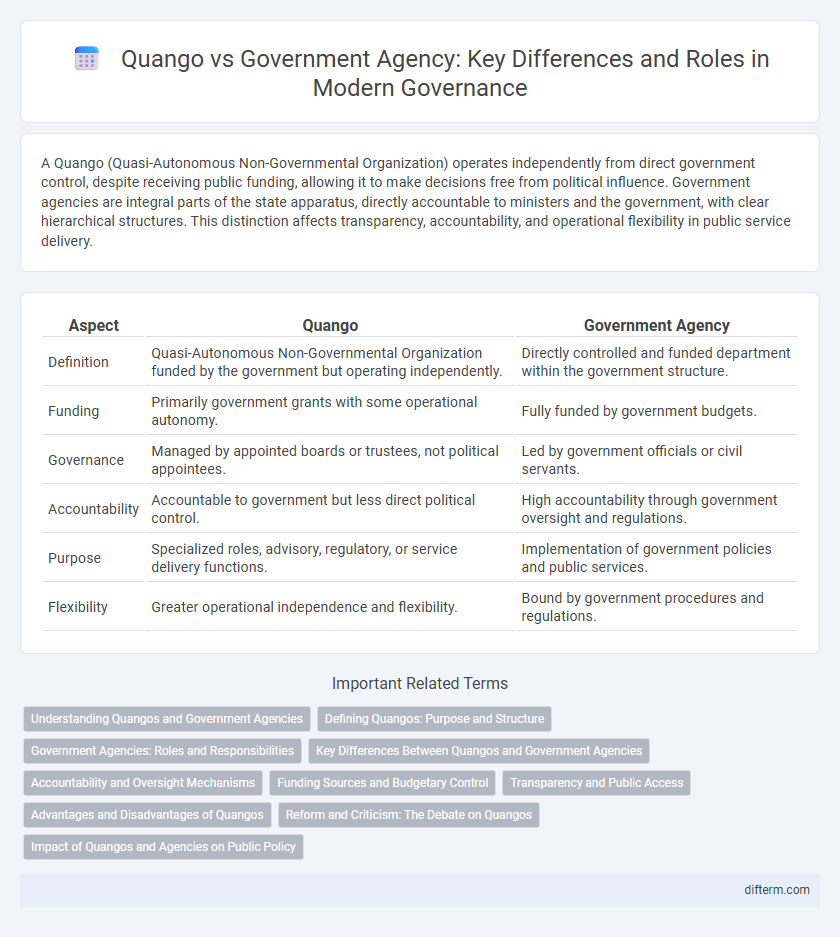A Quango (Quasi-Autonomous Non-Governmental Organization) operates independently from direct government control, despite receiving public funding, allowing it to make decisions free from political influence. Government agencies are integral parts of the state apparatus, directly accountable to ministers and the government, with clear hierarchical structures. This distinction affects transparency, accountability, and operational flexibility in public service delivery.
Table of Comparison
| Aspect | Quango | Government Agency |
|---|---|---|
| Definition | Quasi-Autonomous Non-Governmental Organization funded by the government but operating independently. | Directly controlled and funded department within the government structure. |
| Funding | Primarily government grants with some operational autonomy. | Fully funded by government budgets. |
| Governance | Managed by appointed boards or trustees, not political appointees. | Led by government officials or civil servants. |
| Accountability | Accountable to government but less direct political control. | High accountability through government oversight and regulations. |
| Purpose | Specialized roles, advisory, regulatory, or service delivery functions. | Implementation of government policies and public services. |
| Flexibility | Greater operational independence and flexibility. | Bound by government procedures and regulations. |
Understanding Quangos and Government Agencies
Quangos, or quasi-autonomous non-governmental organizations, operate independently from direct government control while performing public functions, funded partially or wholly by the government. Government agencies are integral parts of the government, directly controlled by ministers and responsible for implementing public policies and delivering services. Understanding the distinctions in accountability, funding, and operational autonomy between quangos and government agencies is essential for assessing their roles in public administration.
Defining Quangos: Purpose and Structure
Quangos, or Quasi-Autonomous Non-Governmental Organizations, serve specialized roles by operating independently from direct government control while performing public functions. These entities are established to provide expert advice, regulate specific sectors, or deliver public services with a degree of operational autonomy that distinguishes them from traditional government agencies. Unlike government agencies, which are integral parts of government departments, quangos possess distinct legal status and governance structures allowing flexible management and specialized focus.
Government Agencies: Roles and Responsibilities
Government agencies function as integral units within the public sector, tasked with implementing laws, delivering public services, and regulating specific sectors to ensure compliance with government policies. These agencies operate under the direct authority of government ministries or departments and are responsible for managing public resources, enforcing legislation, and providing expertise in areas such as health, education, and transportation. Their roles extend to policy enforcement, administration of government programs, and serving as a bridge between the government and citizens to maintain public order and welfare.
Key Differences Between Quangos and Government Agencies
Quangos (quasi-autonomous non-governmental organizations) operate independently from direct government control, often funded by public money but with autonomous decision-making powers, whereas government agencies are fully integrated parts of government, directly accountable to ministers and subject to government policies. Quangos typically focus on specialized tasks or regulatory functions with a degree of impartiality, while government agencies enforce broader public policies and administrative functions within government frameworks. The key differences include their governance structure, accountability mechanisms, and operational independence.
Accountability and Oversight Mechanisms
Quangos (Quasi-Autonomous Non-Governmental Organizations) operate with a degree of independence from direct government control, which often results in varied accountability and oversight mechanisms compared to traditional government agencies. Government agencies are subject to stringent oversight through legislative bodies, executive regulation, and public transparency requirements, ensuring clear lines of accountability. In contrast, quangos typically face less direct scrutiny and may rely on internal boards or appointed trustees, potentially complicating the monitoring of their activities and financial management.
Funding Sources and Budgetary Control
Quangos (Quasi-Autonomous Non-Governmental Organizations) primarily receive funding through government grants but maintain a degree of financial independence, often allowing for flexible budgetary allocations. Government agencies are directly funded by government budgets, with strict oversight and control from central government authorities, ensuring adherence to allocated funds and expenditure policies. This distinction impacts accountability, with quangos having more autonomy in spending while government agencies operate under tighter fiscal constraints.
Transparency and Public Access
Quangos, or quasi-autonomous non-governmental organizations, often operate with less transparency and reduced public access compared to government agencies. Government agencies are typically subject to stricter regulatory frameworks, including freedom of information laws that mandate disclosure of documents and decision-making processes. This increased transparency in government agencies enhances public accountability and trust, whereas quangos may face criticism for opaque operations and limited scrutiny.
Advantages and Disadvantages of Quangos
Quangos, or quasi-autonomous non-governmental organizations, operate independently from direct government control, enabling streamlined decision-making and specialized expertise that can enhance efficiency. However, their semi-autonomous nature often raises concerns about accountability, transparency, and potential duplication of services compared to fully government-controlled agencies. While quangos can reduce political interference, the risk of bureaucratic complexity and public detachment may limit their effectiveness in serving public interests.
Reform and Criticism: The Debate on Quangos
Reform efforts targeting quangos emphasize the need to increase transparency, accountability, and cost-efficiency, responding to criticisms that these quasi-autonomous non-governmental organizations often operate with limited government oversight and ambiguous mandates. Critics argue that quangos can perpetuate bureaucratic inefficiencies and dilute direct political responsibility compared to traditional government agencies, which are directly controlled and funded by government departments. Debates continue over whether reform should involve streamlining or integrating quangos into government agencies to enhance operational coherence and public trust.
Impact of Quangos and Agencies on Public Policy
Quangos (Quasi-Autonomous Non-Governmental Organizations) and government agencies significantly shape public policy by implementing regulations, delivering public services, and advising policymakers with specialized expertise. Quangos often operate with greater independence from direct political control, allowing for more flexible and innovative approaches, though this can raise concerns about accountability and transparency. Government agencies, by contrast, are fully integrated within the governmental hierarchy, ensuring adherence to political priorities but sometimes limiting responsiveness and innovation.
Quango vs Government Agency Infographic

 difterm.com
difterm.com